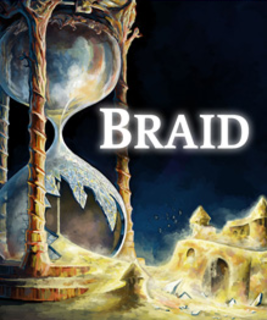Seminal. The Watchmen of video games? Oh, go on, then.
You play as Tim, a young man wearing a suit and a red tie. Tim is searching for a princess, taken from him because of a mistake he made. The story explores Tim's past, trying to find the reasons why he's devoted his life to this search. Though convoluted at times, it's quite cool, and the ending still has me reeling. On the simplest levels, Braid is a story of sorrow and regret, but it goes far deeper than that. Every line of text is ambiguous, begging to be examined and dissected by the player.
The story is complemented by a beautiful yet solemn watercolour palette. Braid's art is entirely handcrafted, and it's wonderful. It looks like a painting come to life, combining vivid hues and delicate background animation to create a truly gorgeous game world. The original score is also fantastic, and fits in nicely with the game's tone. Braid's soundtrack is one of the few I listen to outside of the game - you can hear it too at braid-game.com/news, and you really should. It's equal parts somber and soothing; perfect for tackling the game's many intricate puzzles.
To beat Braid, you'll have to collect a number of puzzle pieces, but this isn't as easy as it might sound. Each piece is 'guarded' by a puzzle that must be solved with your time manipulating powers. Tim starts with the simple ability to rewind time, but every new world throws a new element into the mix. In one world, certain items are immune to your time powers and in another, when you rewind a doppelganger will repeat all your moves. The pacing is great; every time you master a power, you'll move on to the next one, which will force you to think in a whole different way.
Of course, the puzzles themselves are sublime. To get past them, you have to stretch and flex your brain in ways it probably isn't supposed to go. When you finally realize how some of the tougher puzzles were constructed, and how to solve them, it's downright euphoric. It's that great, smug, 'ha ha, I beat it without GameFAQs' feeling you get from only the best adventure games and it's stronger than ever here.
However, some of the puzzles straddle the line between being satisfying and frustrating. For example, to beat one puzzle you have to open the right doors in the right order with the right keys. It's simple enough but if you so much as take one misstep, you won't be able to finish the puzzle and will have to restart the whole level. Other puzzles rely on weird gameplay quirks we never saw before and will likely never see again -- Jonathan, how was I supposed to know jumping up from below an enemy will knock it up? Really?
But these are just nitpicks and honestly, they're inconsequential. Braid represents a higher level of thinking; something rarely touched by the best films and books, and certainly, never before by video games. I've heard the price point has been a bit of a turn-off for some gamers, but it shouldn't be such an impassable barrier. Really, $15 is a small price to pay for what is the most important game of our generation, and possibly of all time.

